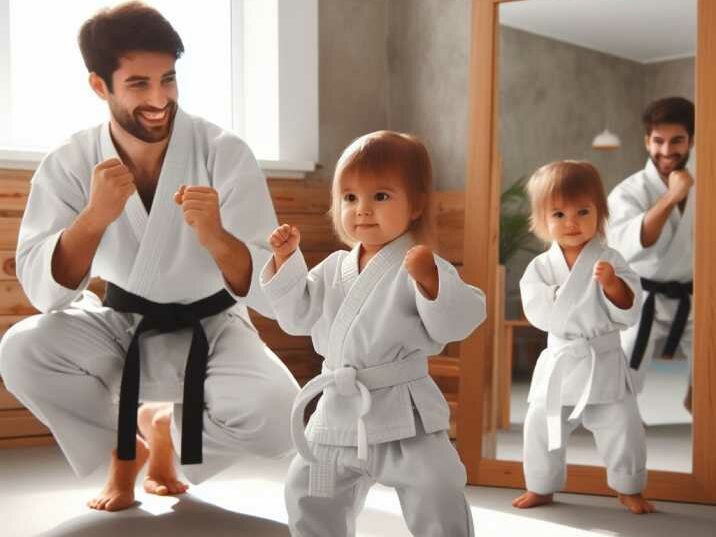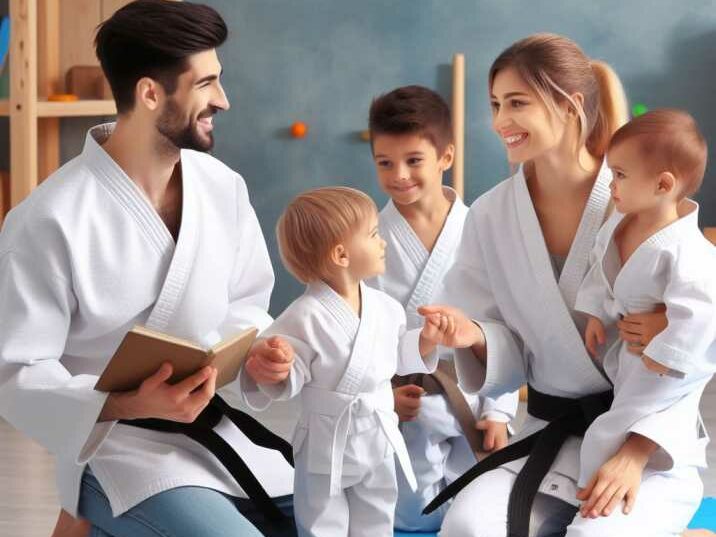Is Karate Good for Toddlers?
Table of Contents
Is karate good for toddlers? As parents, we often find ourselves seeking activities that not only entertain our little ones but also contribute to their overall development. Karate, with its disciplined approach and physical activities, holds the potential to offer a range of benefits to toddlers. Let’s delve into the details and understand whether karate is a suitable choice for your child.
Introduction
In this article, we aim to answer the question, “Is karate good for toddlers?” We will explore the physical and mental benefits of introducing toddlers to karate, addressing concerns and providing insights for parents. From motor skill development to fostering discipline and emotional resilience, we’ll cover various aspects to help you make an informed decision.

The Physical Advantages of Karate for Toddlers and Why It Matters ?
Now, let’s focus on the physical benefits that karate can offer to toddlers. Engaging in karate activities helps enhance their motor skills, coordination, and overall physical fitness. These fundamental aspects play a crucial role in your toddler’s development, setting the stage for a healthy and active lifestyle.
Coordination and Motor Skills: The Building Blocks of Karate
Karate involves precise movements and exercises that contribute significantly to the development of coordination and motor skills in toddlers. Through carefully designed activities, toddlers learn to control their body movements, promoting agility and balance.
Fun and Fitness: Making Exercise Enjoyable for Toddlers
One of the key attractions is karate good for toddlers, is the element of fun infused into the exercises. Turning physical activities into enjoyable experiences not only keeps toddlers engaged but also instills a positive attitude towards fitness from an early age.
The Cognitive Benefits: Karate as a Tool for Mental Development
Is karate good for toddlers? Beyond physical fitness, karate plays a crucial role in enhancing cognitive skills in toddlers. The structured nature of karate classes promotes focus, discipline, and concentration, laying the foundation for academic and life success.
Focus and Concentration: Nurturing Cognitive Abilities
Karate requires toddlers to focus on specific tasks and follow instructions, fostering concentration and attention to detail. These skills not only benefit them in the dojo but also contribute to their ability to learn and engage in various activities.
Discipline and Routine: Setting the Stage for Future Success
Introducing toddlers to the discipline of karate helps establish routines and a sense of structure. These early lessons in discipline can positively influence their behavior and approach towards challenges as they grow older.
Social Skills and Emotional Well-being: Karate as a Holistic Experience
Is karate good for toddlers? Karate is not just about physical and cognitive development; it also serves as a platform for building social skills and emotional resilience in toddlers. Let’s explore how karate contributes to the holistic well-being of your child.
Teamwork and Respect: Fostering Social Bonds in Karate Classes
Karate classes create a supportive environment where toddlers learn the importance of teamwork and respect for others. These social skills are crucial for navigating relationships and interactions as they progress through childhood.
Emotional Resilience: Facing Challenges with Confidence
Through the challenges presented in karate classes, toddlers develop emotional resilience. Learning to overcome obstacles and setbacks in a controlled environment prepares them to face life’s uncertainties with confidence.
Safety First: Considerations for Toddlers in Karate Classes
While the benefits of karate for toddlers are evident, safety is paramount. In this section, we’ll discuss essential considerations, including instructor qualifications, age-appropriate techniques, and creating a safe training environment.
Qualified Instructors: Ensuring a Safe Learning Environment
Choosing a karate class with qualified instructors is crucial for your toddler’s safety. Experienced instructors understand the unique needs of toddlers and can adapt techniques accordingly, minimizing the risk of injury.
Age-Appropriate Techniques: Striking the Right Balance
Karate classes for toddlers should focus on age-appropriate techniques that challenge them without posing unnecessary risks. Understanding the importance of adjusting techniques ensures a safe and enjoyable learning experience.
Parental Role in Toddler Karate: Support and Encouragement
As a parent, your involvement in your toddler’s karate journey is vital. In this section, we’ll explore the ways in which parents can support and encourage their little ones, both during classes and at home.

Attending Classes: Strengthening the Parent-Toddler Bond
Attending karate classes with your toddler not only strengthens the parent-toddler bond but also allows you to witness their progress firsthand. Your presence provides emotional support and encouragement.
Encouraging Practice at Home: Making Karate a Family Activity
Encouraging your toddler to practice karate at home reinforces the lessons learned in class. Transforming karate into a family activity fosters a positive attitude towards physical fitness and discipline.
Conclusion:
In conclusion, the question “Is karate good for toddlers?” leads us to a resounding yes. The physical, cognitive, social, and emotional benefits of introducing toddlers to karate are vast. As parents, it’s essential to consider the holistic development that karate offers, ensuring a positive and enriching experience for your little ones.
12 Frequently Asked Questions (FAQs):
- What age is suitable for toddlers to start karate? Karate classes tailored for toddlers usually start accepting children as young as three years old. However, it’s essential to choose classes specifically designed for this age group.
- How can I ensure my toddler’s safety during karate classes? Ensuring safety involves selecting qualified instructors, verifying the age-appropriateness of techniques, and observing the training environment. Always communicate openly with the instructor about any concerns.
- Are there long-term benefits of introducing toddlers to karate? Yes, studies suggest that toddlers engaged in karate may experience long-term benefits in terms of physical fitness, cognitive development, and improved social skills.
- How can parents support their toddlers in karate classes? Parents can support their toddlers by attending classes, encouraging practice at home, and maintaining open communication with both the child and the instructor.
- What if my toddler loses interest in karate? It’s normal for toddlers to explore different interests. If your toddler loses interest in karate, consider trying other activities that align with their preferences.
- Can karate help toddlers with behavioral issues? Karate’s structured environment and focus on discipline can positively impact toddlers with behavioral issues. However, it’s essential to consult with professionals for personalized guidance.
- Is there a risk of injury for toddlers in karate? With proper supervision, age-appropriate techniques, and a safe training environment, the risk of injury is minimized. It’s crucial to choose reputable karate schools that prioritize safety.
- How often should toddlers attend karate classes? The frequency of classes depends on the child’s age, the school’s recommendations, and parental preferences. Generally, one to two classes per week is a common starting point for toddlers.
- Can toddlers participate in karate competitions? While competitions are not typical for toddlers, some schools may organize non-competitive events or demonstrations to showcase the children’s progress.
- How can I find the right karate class for my toddler? Research local karate schools, read reviews, and visit the schools in person. Ask about their approach to teaching toddlers and ensure they prioritize safety and age-appropriate techniques.
- Are there specific benefits for toddlers with special needs in karate? Karate can be adapted to accommodate toddlers with special needs, offering benefits such as improved coordination, focus, and self-confidence. It’s crucial to communicate with instructors about any special requirements.
- What equipment does my toddler need for karate classes? Basic equipment includes a karate uniform (gi), which can be purchased from the school, and any additional safety gear recommended by the instructor, such as padded gloves or shin guards.


